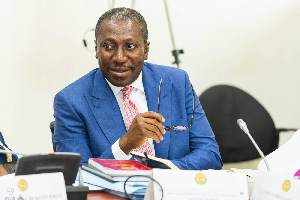Accra, Aug.8, GNA - A two-day Africa Regional forum on internet interconnectivity was on Monday opened in Accra to foster a discussion on cross-border interconnection approaches, economics and challenges among countries in the Sub-region.
The forum, which is the second of its kind to be held in Africa, is under the theme: "Outlining the Business Case for Regional Interconnection." It is being hosted by the National Information Technology Agency (NITA= ) and is also aimed at providing insight on practical skills, techniques and tools that could be used to improve network connectivity. Mr Haruna Iddrisu, Minister of Communications, in his opening address commended the Internet Society for the initiative at a time when developments in the global economy and rapid growth in the Information and Communication Technology (ICT) industry in Ghana were resulting in fundamental changes in the daily activities of people. He said the internet has become an essential tool for communication, commerce and development in an increasingly globalised world. As a result of that governments around the world have given high priority to the development of their national internet infrastructure to achieve higher internet penetration levels among their populations. Mr Iddrisu said the Ministry welcomed the Africa Peer Interconnection Forum given the obvious contribution points to lowering costs to providers and improving affordability of Internet access in general. He said to maximize the benefits of internet interconnectivity, ongoin= g policy and regulatory changes in Africa had shifted from being heavily dependent on satellite connectivity to fibre optic and terrestrial wireless networks such as WiMAX and LTE.
Mr Iddrisu said the symbolic completion of the second phase of the fibre backbone by the National Communications Backbone Company was now available to be interfaced with the four submarine cables SAT-3, Main One, Glo1 and West African Cable System, which have landed on our shores. This is as part of the steps to broaden access and minimize cost, he said, stressing that the investments had brought all players into a new era, with realities as to how to interact to benefit from the opportunities provided by new and upcoming cable systems. "We have all witnessed the signs of change on the African landscape with the recent investment in submarine cables, terrestrial infrastructures, mobile and wireless data technologies, all of which are addressing the problem," he said.
Mr Iddrisu, however, expressed worry about the fact that while these developments were addressing some of the challenges that had contributed to the slow Internet growth in the Region, especially in the rural areas, most of the African cross-border Internet traffic was still exchanged in Europe and North America, a phenomenon which needed to be urgently addressed. He said the Ministry had developed policies and regulations to improve Internet access and this had provided the enabling environment for increased investment in the ICT industry. He said the Government of Ghana was currently deploying the e-Governance Network which had extensive fibre and wireless infrastructure connecting all Ministries, Departments and Agencies to improve government business and create the platform for development of applications for citizens and this would be managed and operated by NITA.
The Minister challenged the Internet Society in Ghana to take up the outcome of the discussions and create a local forum for supporting the development of local Internet Exchange Points (IXPs) and for sustaining the operations of the existing points. Dr Nii Narku Quaynor, Chairman, NITA, expressed the hope that the forum would emerge with clear options, strategies and feasible recommendations to be presented in moving forward internet interconnectivity in Africa at the next Internet Governance Forum to be held in Kenya in September.
General News of Tuesday, 9 August 2011
Source: GNA
Africa regional forum on internet connection opens
Entertainment











